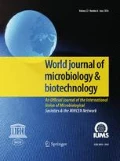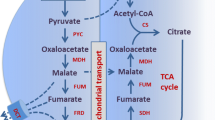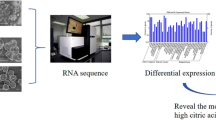Abstract
Aspergillus carbonarius is an efficient producer of organic acids with great potential for bio-based production of organic acids. In this study, we identified a gene f2kp encoding the enzyme 6-phosphofructo-2-kinase known as an allosteric regulator of the glycolytic flux and investigated its role in the production of organic acid. The strategy was to examine the impact of citric acid and malic acid production by overexpressing and disrupting f2kp, respectively. The overexpressing transformants expressed f2kp at higher level than the wild type, whereas no expression of f2kp was detected in the knockout transformants. Citric acid and malic acid production by the knockout strains decreased sharply along with a significant lower sugar consumption, though the overexpressing transformants produced similar amounts of citric acid and malic acid as the wild type. We conclude that 6-phosphofructo-2-kinase has an important regulatory role for the glycolytic flux and organic acid production in A. carbonarius.




Similar content being viewed by others
References
Andreou L (2013) Preparation of genomic DNA from bacteria. Methods Enzymol 529:143–151
Arts E, Kubicek CP, Rohr M (1987) Regulation of phosphofructokinase from Aspergillus niger: Effect of fructose 2,6-bisphosphate on the action of citrate, ammonium ions and AMP. J Gen Microbiol 133:1195–1199
Capuder M, Šolar T, Benčina M, Legiša M (2009) Highly active, citrate inhibition resistant form of Aspergillus niger 6-phosphofructo-1-kinase encoded by a modified pfkA gene. J Biotechnol 144:51–57
Darouneh E, Alavi A, Vosoughi M, Arjmand M, Seifkordi A, Rajabi R (2009) Citric acid production: surface culture versus submerged culture. Afr J Microbiol Res 3:541–545
Habison A, Kubicek CP, Rohr M (1983) Partial purification and regulatory properties of phosphofructokinase from Aspergillus niger. Biochem J 209:669–676
Hansen NB, Lübeck M, Lübeck PS (2014) Advancing USER cloning into simpleUSER and nicking cloning. J Microbiol Methods 96:42–49
Jojima T, Inui M (2015) Engineering the glycolytic pathway: a potential approach for improvement of biocatalyst performance. Bioengineered 6:328–334
Kubicek-Pranz EM, Mozelt M, Rohr M, Kubicek CP (1990) Changes in the concentration of fructose 2,6-bisphosphate in Aspergillus niger during stimulation of acidogenesis by elevated sucrose concentration. Biochim Biophys Acta Gen Subj 1033:250–255
Magnuson JK, Lasure LL (2004) Organic acid production by filamentous fungi. Adv Fungal Biotechnol Ind Agric Med 1:307–340
Mesojednik S, Legiša M (2005) Posttranslational modification of 6-phosphofructo-1-kinase in Aspergillus niger. Appl Environ Microbiol 71:1425–1432
Mlakar T, Legiša M (2006) Citrate inhibition-resistant form of 6-phosphofructo-1-kinase from Aspergillus niger. Appl Environ Microbiol 72:4515–4521
Nour-Eldin HH, Geu-Flores F, Halkier BA (2010) USER cloning and USER fusion: the ideal cloning techniques for small and big laboratories. Anonymous plant secondary metabolism engineering. Springer, Berlin, pp 185–200
Okar DA, Lange AJ (1999) Fructose-2,6-bisphosphate and control of carbohydrate metabolism in eukaryotes. BioFactors 10:1–14
Papagianni M (2007) Advances in citric acid fermentation by Aspergillus niger: Biochemical aspects, membrane transport and modeling. Biotechnol Adv 25:244–263
Peksel A, Torres N, Liu J, Juneau G, Kubicek C (2002) 13C-NMR analysis of glucose metabolism during citric acid production by Aspergillus niger. Appl Microbiol Biotechnol 58:157–163
Teslaa T, Teitell MA (2014) Techniques to monitor glycolysis. Methods Enzymol 542:91–114
Veiter L, Rajamanickam V, Herwig C (2018) The filamentous fungal pellet-relationship between morphology and productivity. Appl Microbiol Biotechnol 102:2997–3006
Weyda I, Lübeck M, Ahring BK, Lübeck PS (2014) Point mutation of the xylose reductase (XR) gene reduces xylitol accumulation and increases citric acid production in Aspergillus carbonarius. J Ind Microbiol Biotechnol 41:733–739
Yang L, Lübeck M, Lübeck PS (2014) Deletion of glucose oxidase changes the pattern of organic acid production in Aspergillus carbonarius. AMB Express 4:54
Yang L, Lübeck M, Lübeck PS (2015) Effects of heterologous expression of phosphoenolpyruvate carboxykinase and phosphoenolpyruvate carboxylase on organic acid production in Aspergillus carbonarius. J Ind Microbiol Biotechnol 42:1533–1545
Yang L, Lübeck M, Souroullas K, Lübeck PS (2016) Co-consumption of glucose and xylose for organic acid production by Aspergillus carbonarius cultivated in wheat straw hydrolysate. World J Microbiol Biotechnol 32:57
Yang L, Christakou E, Vang J, Lübeck M, Lübeck PS (2017a) Overexpression of a C4-dicarboxylate transporter is the key for rerouting citric acid to C4-dicarboxylic acid production in Aspergillus carbonarius. Microb Cell Fact 16:10
Yang L, Lübeck M, Lübeck PS (2017b) Aspergillus as a versatile cell factory for organic acid production. Fungal Biol Rev 31:33–49
Acknowledgement
This work was supported by The Danish Council for Strategic Research (BIOREF, Grant No. 09-065165)
Author information
Authors and Affiliations
Corresponding author
Ethics declarations
Conflict of interest
The authors declare no conflict of interests.
Research involving animal and human rights
This study does not contain any experiment with human participants or animals performed by any of the authors.
Additional information
Publisher's Note
Springer Nature remains neutral with regard to jurisdictional claims in published maps and institutional affiliations.
Electronic supplementary material
Below is the link to the electronic supplementary material.
Rights and permissions
About this article
Cite this article
Yang, L., Nilsson, L., Lübeck, M. et al. Disruption and overexpression of 6-phosphofructo-2-kinase influence organic acid production in Aspergillus carbonarius ITEM 5010. World J Microbiol Biotechnol 36, 98 (2020). https://doi.org/10.1007/s11274-020-02877-4
Received:
Accepted:
Published:
DOI: https://doi.org/10.1007/s11274-020-02877-4




